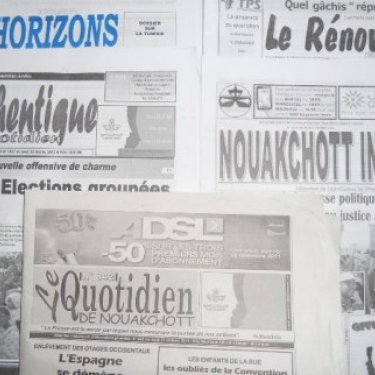Wave of media interrogations in Mauritania

Mauritanian journalists have been arrested and interrogated at length by the police for the third time this year, in what Reporters Without Borders (RSF) regards as an attempt by the authorities to reinforce their control of the independent media.
The interrogations, which were heavy-handed in some cases, took place on 25 August. The authorities said the targets – the editors and publishers of leading French-language newspapers and websites – were questioned “in connection with national security.”
Cridem news website editor Babacar Mbaye Ndaye (and his administrator Della Ba), Quotidien de Nouakchott publisher Moussa Saby Sy and Mauriweb news website editor Jeidna Deidawere were interrogated by members of the Economic Crimes Squad about their alleged financial ties with Mohamed Ould Bouamatou, an opposition businessmen in exile.
The police also tried to pick up a fourth journalist for questioning, Ahmed Ould Cheikh, the editor of the weekly Le Calame, but he was out of the country. Cheikh is well known for writing editorials that are extremely critical of the government.
The other three journalists were questioned about their coverage of stories that are sensitive for the government.
These include the case of Mohamed Ould Ghadde, a senator leading the opposition to the senate’s elimination, who has been held since 11 August, and the management problems at the influential National Industrial and Mining Company (SNIM), which resulted in major strikes in 2015.
“We condemn the use of such intimidatory methods against privately-owned media in Mauritania,” said RSF. “It is now impossible to criticize the government’s actions without being accused of being a political opponent. The role of journalists is to inform, which sometimes includes relaying alternative opinions.”
Echoing the government’s position, Union of Mauritanian Journalists president Mohamed Salem Ould Dah denied that the journalists had been interrogated in connection with their journalistic activities.
But Mamadou Sy, the publisher of the newspaper Eveil Hebdo and former president the Mauritanian Press Alliance (RPM), said the interrogations were clearly designed to discredit the press in the public’s eyes.
“They are trying to make people believe that the media cannot survive without corruption,” he said. “The gravest aspect is the way the finger is pointed at journalists in order to know who wrote what article and how newspapers are funded. This is an attack on their independence and on media freedom.”
Mauritania is ranked 55th out of 180 countries in RSF’s 2017 World Press Freedom Index. Mohamed Cheikh Ould Mohamed, a blogger sentenced to death for blasphemy in 2014, is still being held despite having issued a formal retraction and apology.



